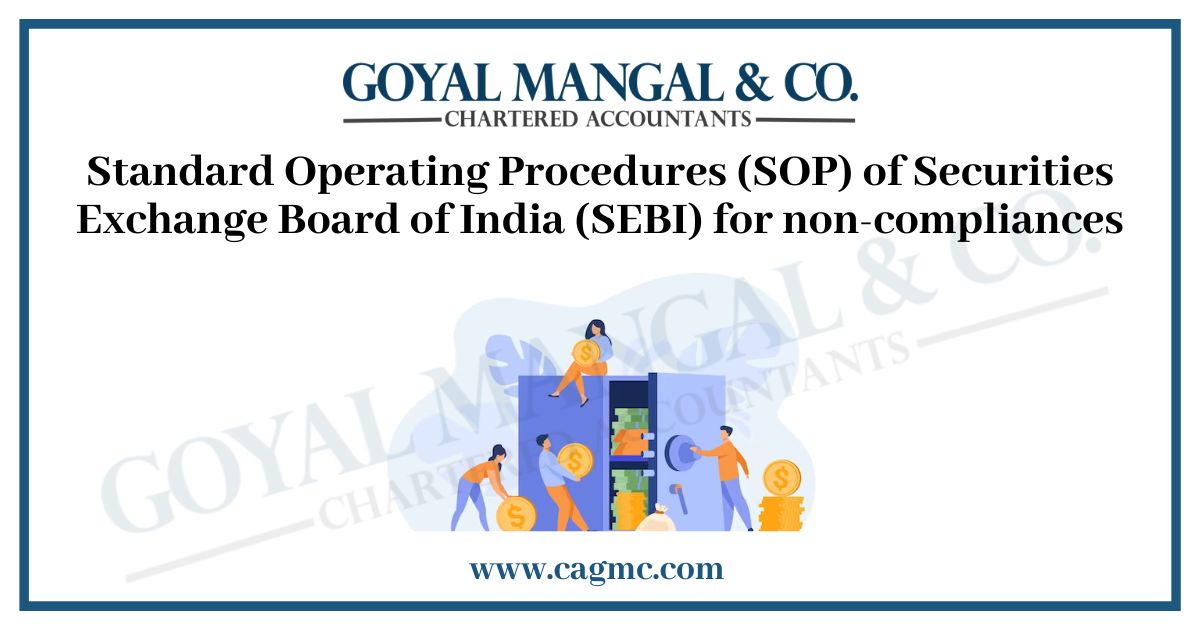
On receiving notification from the concerned recognized stock exchange, the depositories shall freeze or unfreeze the promoter’s entire shareholding in such non-compliant listed entity and all other securities held in their demat account to ensure effective enforcement of the Listing Regulations. If a non-compliant entity is listed on multiple recognized stock exchanges, the concerned exchanges shall take uniform action. In this article we will have a look upon SOP issued by SEBI for non-compliances.
Securities and Exchange Board of India (SEBI)
The Securities and Exchange Board of India (SEBI) was created by the Indian government in 1992 to regulate the securities market and safeguard investors.
SEBI regulates and inspects stock exchanges, requires regular returns, approves byelaws, inspects financial intermediaries like banks, compels companies to be listed on one or more exchanges, and registers brokers.
Mechanism
It has been determined to issue the current Circular in supersession of the said Circular bearing number SEBI/HO/CFD/CMD/CIR/P/2018/77 dated May 3, 2018, to comply with the Listing Regulations amendments and further streamline the Standard Operating Procedure (SOP) for dealing with non-compliances. From now on, stock exchanges must, while considering the needs of investors and the securities market must follow the below mentioned steps:
- If the Listing Regulations are not followed as described in Annexure I of this Circular, take appropriate action.
- Follow the Standard Operating Procedure (“SOP”) as outlined in Annexure II of this Circular for the suspension and reversal of the suspension of trading of designated securities. The required, stock exchanges may stray from the but only after noting the reasons in writing.
Why Standard Operating Procedures (SOP) of Securities Exchange Board of India (SEBI) for non-compliances is necessary?
The Securities Exchange Board of India’s (SEBI) Standard Operating Procedures (SOP) for non-compliances are required for a several reasons:
- Uniformity: The SOP offers a consistent framework for levying penalties and handling violations of the SEBI Listing Obligations and Disclosure Requirements (LODR) rules.
- Clarity: The SOP makes clear the procedure for suspending and cancelling the trading of specific securities if certain SEBI LODR laws are broken.
- Transparency: By offering a defined plan of action, the SOP guarantees transparency in the process of dealing with non-compliances.
- Accountability: The SOP penalizes businesses that violate the SEBI LODR rules by levying fines and other sanctions.
- Efficiency: The SOP streamlines the procedure for handling non-compliances, improving its effectiveness.
Overall, the SOP of SEBI for non-compliances is necessary to ensure that companies comply with the SEBI LODR regulations, maintain transparency and accountability, and promote efficiency in the process of dealing with non-compliances.
Annexure I – Steps to be taken in case of non-compliance
As per SEBI the following steps need to be taken by stock exchange in case of non-compliances:
- If a listed entity violates the terms of the Listing Regulations and any circulars or guidelines issued thereunder, the recognized stock exchanges must take enforcement action.
- Concerned recognized stock exchanges shall publish information about the listed entity’s noncompliance, including information about any fines or other sanctions, on their websites.
- If the non-compliant listed entity complies and pays the fee levied in accordance with this circular, the concerned recognized stock exchanges shall disclose on their website details of compliance and fines paid by the listed entity.
- The recognized stock exchanges shall notify the depositories to unfreeze the promoter’s complete shareholding in such entity and all other securities held in their demat account immediately upon compliance.
- If a non-compliant listed entity fails to pay the fine after receiving the notice, the recognized stock exchanges may take enforcement action.
- The recognized stock exchanges shall advise the listed entity that is not in compliance to make sure that the matter of non-compliance that has been identified and indicated by the recognized stock exchanges and any subsequent action taken by the recognized stock exchanges in this regard shall be brought before the Board of Directors of the company at its subsequent meeting. T
- he recognized stock exchanges shall receive proper notice of any comments made by the board for dissemination.
Annexure II – Standard Operating Procedure
According to this circular, if a listed entity violates the Listing Regulations, the relevant recognized stock exchanges shall:
- Move the listed entity’s stock to the “Z” category, where transactions must be made on a “Trade for Trade” basis.
- Suspend trading in the shares of the listed entity in accordance with the procedure mentioned in the SOP.
- The recognized stock exchanges shall lift the suspension of trading in the non-compliant listed entity’s shares if the non-compliant listed entity complies with the requirements after the date of suspension.
- In accordance with the Securities Contracts (Regulation) Act 1956, the Securities Contracts (Regulation) Rules of 1957, and the Securities and Exchange Board of India ((Delisting of Equity Shares) Regulations, the recognized stock exchanges shall begin the process of compulsorily delisting the non-compliant listed entity if it does not comply with the necessary requirements within six months of the date of suspension.
Standard operating procedure for moving the scrip to “Z” Category
In accordance with the terms of this circular, if a listed entity fails to comply with the Listing Regulations as described above the concerned recognized stock exchanges shall, in addition to levying a fine, move the listed entity’s stock to the “Z” category, where trades must be conducted on a “Trade for Trade” basis.
However, the concerned recognized stock exchanges must give a written notification to the listed entity that isn’t in compliance with the requirements within 7 days of the intimation date before shifting the scrip to the “Z” category.
Standard operating procedure for suspending the trading
The standard procedure needs to be followed for suspension of trading is:
- A listed entity will not face suspension proceedings if it complies with the pertinent Listing Regulations provisions.
- The concerned recognized stock exchanges must deliver a written notice to the non-compliant listed entity requesting that it comply with the relevant requirements and pay the appropriate penalties within 21 days of the date of the notice before suspending the trading of a scrip.
- To ensure that the date of suspension is consistent throughout all recognized stock exchanges, the recognized stock exchanges shall also inform other recognized stock exchanges where the shares of the non-compliant entity are listed.
- In addition, 30 days before the suspension date, the recognized stock exchanges must post a public notice on its website suggesting a potential suspension of trading in the shares of the listed non-compliant entity.
Standard operating procedure for revocation of suspension of trading
The standard procedure for revocation of suspension of trading is:
- The recognized stock exchange must publish a notice on its website on the date of compliance informing the public that the listed entity has complied with the requirements. If the non-compliant listed entity does so after trading in its shares has been suspended.
- After seven days have passed from the date of the notice, the recognized stock exchanges must reinstate the suspension of trade in the company’s shares.
- When issuing the notice, the recognized stock exchanges must notify each additional recognized stock exchanges where the entity’s shares are listed.
- Following the lifting of the suspension, trading in the entity’s shares will once again fall under the usual trading category following a seven-day period during which it will only be authorized on a “Trade for Trade” basis.
Takeaway
The SEBI Standard Operating Procedure (SOP) for Non-Compliances is vital to ensuring that businesses follow the SEBI LODR requirements, as well as fostering accountability, transparency, and efficiency. SEBI determines the amount of fine for non-compliance with its SOP through a combination of a uniform structure and circulars specifying the amount of fine to be levied in case of non-compliances. SEBI ensures effective enforcement of its SOP through a combination of depositories, recognized stock exchanges, imposing fines, and suspension/revocation of trading.


